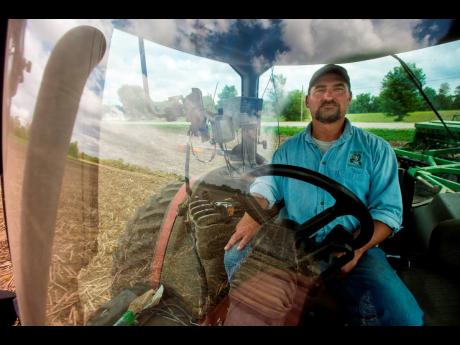Trump’s ‘great patriot’ farmers follow him into a trade war
MADRID, Iowa (AP):
Iowa farmer Tim Bardole survived years of low crop prices and rising costs by cutting back on fertiliser and herbicides and fixing broken-down equipment rather than buying new. When President Donald Trump’s trade war with China made a miserable situation worse, Bardole used up any equity his operation had and started investing in hogs in hopes they’ll do better than crops.
A year later, the dispute is still raging and soybeans hit a 10-year-low. However, Bardole says he supports his president more today than he did when he cast a ballot for Trump in 2016, sceptical he would follow through on his promises.
“He does really seem to be fighting for us,” Bardole says, “even if it feels like the two sides are throwing punches and we’re in the middle, taking most of the hits.”
Trump won the presidency by winning rural America, in part by pledging to use his business savvy and tough negotiating skills to take on China and put an end to trade practices that have hurt farmers for years. While the prolonged fight has been devastating to an already-struggling agriculture industry, there’s little indication Trump is paying a political price.
But there’s a big potential upside if he can get a better deal – and little downside if he continues to get credit for trying for the farmers caught in the middle. It’s a calculation Trump recognises heading into a re-election bid where he needs to hold on to farm states like Iowa and Wisconsin and is looking to flip others, like Minnesota.
82% APPROVAL
A March CNN/Des Moines Register poll of registered Republicans in Iowa found 81 per cent approved of how Trump is handling his job, and 82 per cent had a favourable view of the president, an increase of five points since December. About two-thirds said they’d definitely vote to re-elect him. The poll had a margin of error of 4.9 percentage points.
A February poll by the same organisations found 46 per cent of Iowans approved of the job Trump was doing — his highest approval rating since taking office — while 50 per cent said they disapprove. The margin of error was 3.5 percentage points.
Many farmers are lifelong Republicans who like other things Trump has done, such as reining in the EPA and tackling illegal immigration, and believe he’s better for their interests than most Democrats even on his worst day. They give him credit for doing something previous presidents of both parties mostly talked about. And now that they’ve struggled for this long, they want to see him finish the job – and soon.
“We are the frontline soldiers getting killed as this trade war goes on,” said Paul Jeschke, who grows corn and soybeans in northern Illinois, where he’s about to plant his 45th crop.
UNHAPPY
“I’m unhappy and I think most of us are unhappy with the situation. But most of us understand the merits,” he added. “And it’s not like anyone else would be better. The smooth-talking presidents we’ve had recently - they certainly didn’t get anything done.”
When the trade war started last summer, China targeted its first round of tariffs on producers in agricultural and manufacturing states that were crucial to Trump’s 2016 victory, such as Iowa, Michigan, Ohio and Wisconsin. Particularly hard hit were producers of soybeans, the country’s largest farm export.
The most recent round of trade talks between the Trump administration and China broke up earlier this month without an agreement, after Trump accused China of backing out on agreed-to parts of a deal and hiked tariffs on US$200 billion of imports from China. China imposed retaliatory tariff hikes on US$60 billion of American goods, and in the US the price of soybeans fell to a 10-year low on fears of a protracted trade war. US officials then listed US$300 billion more of Chinese goods for possible tariff hikes.
As China vowed to “fight to the finish,” Trump used Twitter to rally the farming community.
To partially offset the plunge in sales caused by the tariffs, Trump promised an aid package, some $15 billion for farmers and ranchers, following $11 billion in relief payments last year.

